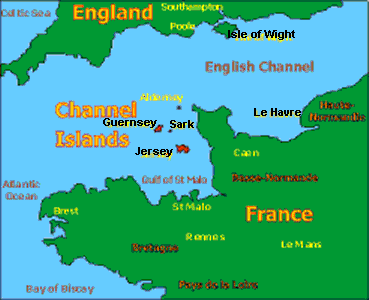
A Guernsey Incorporated Cell Company (ICC) differs from a Protected Cell Company (PCC). Each ICC cell has its own Memorandum, Articles of Incorporation, Board of Directors, and is a separate legal entity which can file lawsuits on its own and be sued in a court of law. PCC’s don’t have any of the above-mentioned features because they are under the umbrella of the core PCC Company. In addition, each ICC cell can engage in contracts with third parties including with other cells in the same company where cells in a PCC cannot do.
The Guernsey Companies Law of 2008 established ICC’s and governs their formation, activities, and dissolution.
Foreigners can own all of the shares in an ICC and in their separate cells.
Benefits
A Guernsey Incorporated Cell Company (ICC) enjoys these benefits:
• Foreigners can Own the ICC or Cells: Foreigners can own all of the shares in an ICC or individual cells.
• Tax Free: Non-resident ICC’s and cells can be completely tax free. However, U.S. residents must report all income to their government as everyone subject to global taxation.
• Privacy: The names of the beneficial owners and shareholders never appear in any public records.
• One Shareholder: Only one shareholder is required to form an ICC.
• One Director: Only one director can form an ICC who can be the sole shareholder.
• Limited Risks: Since each cell is a separate legal entity from the others, investment risks are limited.
• Asset Protection: Assets held by each cell is owned by a separate legal entity keeping them away from creditors.
• No Meetings: Annual general meetings may be waived
• No Audits: Audit requirements can be waived.
• English: Guernsey is an English speaking jurisdiction.

Guernsey Incorporated Cell Company (ICC) Name
ICC’s cannot select a company name already used by another legal entity in Guernsey or a name that is too similar.
The following words must be included in an ICC name “Incorporated Cell Company” or “Incorporated Cell” or their appropriate abbreviations of “ICC” or “IC”.
Advantages
ICC’s allow for a corporate group structure at a lower cost than typical stand-alone non-cellular companies. In addition, ICC cells may provide greater protection against the liabilities of other cells in a PCC because they are incorporated cells rather than cells under one corporate umbrella.
Types of ICC’s
The following types of companies can become ICC’s:
1. Insurance companies;
2. Investment vehicles registered under the Protection of Investors Law of 1987 (POI);
3. All other types of companies administered by someone licensed under the following types of Guernsey laws: POI, banking, controlled investments, insurance, fiduciaries, and company directors.
Types of Cells
Besides the types of companies which can become ICC’s, individual cells can be used to create private investment vehicles for a single family where each investment has different requirements.
Unrelated clients can invest through one or more dedicated cells.
Cells can act as holding companies for different clients while remaining under the same corporate structure. This allows investment managers better flexibility and freedom to manage and separate investment risks into isolated cells.
Cells are also useful for multiple managed accounts.
GFSC
The Guernsey Financial Services Commission (GFSC) must first approve the company as an ICC before it can incorporate as an ICC.
Incorporation of a Cell
The ICC may pass a special resolution authorizing the incorporation of one or more cells. The resolution must include the Memorandum and the Articles of Incorporation for each cell to be included with the application to the Registrar for incorporation of the cell.
Status of a Cell
Cells are not subsidiaries of the ICC. An ICC can own shares in its own cells and a cell can own shares in another cell unless the cell’s Memorandum and Articles of Incorporation prohibit it. Cells cannot own shares in the ICC.

Shareholders
Only one shareholder is required who can be a citizen of and residing in any country.
Directors
Only one director is required which can be a corporate body or a natural person.
Even though each cell has its own directors, they must be the same ones as for the core ICC.
Secretary
The ICC’s secretary must also be the secretary for each cell. A company secretary is not required.
Separation of Assets and Liabilities
The assets and liabilities of the cells must be kept separate from the other cells within the same ICC.
The law allows the ICC’s and its cells assets to be accumulated for investments and managed as long as they are identifiable as separate assets of the cell and/or the ICC.
Contracts with Third Parties
An ICC can enter into contracts with third parties on behalf of the cells. However, cells cannot enter into contracts on behalf of the ICC or the other cells. The ICC officers and directors must clearly identify the ICC or cell as a party to a contract.
Management of Cells
ICC’s must keep a register of its members and the members of each cell at the registered office.
In addition, ICC’s must maintain a register of its directors and a separate register of its secretaries for each cell.
Registered Office and Agent
Every ICC must have a local registered office. Each cell must designate the same address as its registered office. The ICC and each cell must also have a registered agent.
Accounting
The ICC must maintain accounting records for itself and for each cell along with minute books and records.
The ICC directors must prepare all accounts for the ICC and the cells. The ICC is responsible for keeping all accounting records for itself and the cells.
Every cell must appoint an auditor for annual audits unless it passes a waiver resolution or the directors pass a resolution reasonably resolving that audits will not be required.
Within 12 months from the end of each fiscal year the ICC and the cells must send copies of their accounts, audits, and director’s report to their membership. Any member who asks for a copy of those documents, compliance must be accomplished within 7 days from the request. The ICC is held responsible for compliance of these requests.
Annual General Meetings
Every ICC is required to conduct annual general meetings of the shareholders unless the shareholders waive such requirements. If the Memorandum and the Articles of Incorporation do not require annual general meetings, they do not have to be held.
Taxes
Unlike a PCC where the core and its cells are treated as one for tax purposes, every cell in an ICC are treated as separate legal entities by the tax authorities. An ICC can have non-resident and resident cells for tax purposes.
Non-resident cells are not subject to any taxes in Guernsey.
Public Records
While the directors of an ICC and each cell will be part of the public records, the names of the shareholders and beneficial owners are not providing them with complete privacy.
Conclusion
A Guernsey Incorporated Cell Company (ICC) has these benefits: 100% ownership of the ICC and the cells, no taxes, privacy, asset protection, limited risks, one shareholder and one director who can be the sole shareholder, no required meetings, audits can be waived, and English is spoken everywhere.


